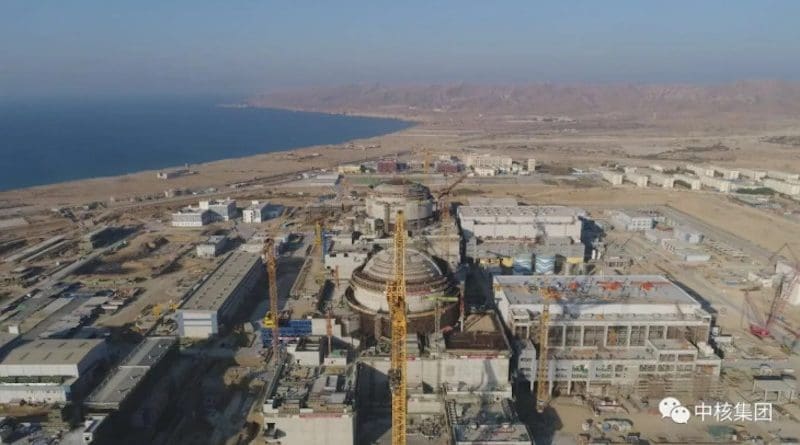Promoting International Cooperation In Peaceful Uses In Context Of International Security – OpEd
By Sher Bano
In November, 2021 the first committee of 76 UNGA (United Nations General Assembly) approved a draft resolution on arms control and international security submitted by China. This has been a concrete action taken by China in order to safeguard world peace, uphold multilateralism and promote common development that reflects the interest of entire international community and common position among the developing countries. This resolution in an important step against the biased approach of international community in the International Non-Proliferation Regime (NPR).
The resolution called “Promoting International Cooperation in Peaceful Uses in the Context of International Security” stresses upon the significance of peaceful use of nuclear technology and science for social and economic development. It urges the international community to remove restrictions upon the peaceful uses of science and technology on the developing countries that fulfill the obligations by the NPR on non-proliferation. In more than thirty years this was the first time that such measure on international arms control and disarmament issue was proposed by China in the United Nations. The acceptance of such a resolution by the UN was the beginning of an inclusive, fair and open dialogue process within the United Nations General Assembly Framework. This resolution is of great significance for safeguarding the legitimate interests and rights of all the countries to pursue the peaceful use of science and technology and to address the challenges posed by science and technology development properly.
The head of Chinese delegation to UNGA, Cheng Suang stated that the recent technological wave, rights and the peace enjoyed by all countries should be protected and respected. With the passage of such a resolution China had played a very constructive and positive role in international arms control and disarmament. Twenty-six countries including Syria, Russia, Cuba and Pakistan also took part in the joint resolution presented by China that presented the concerns and appeal of developing countries on peaceful uses of nuclear technology.
Pakistan being a responsible nuclear state has always supported the peaceful uses of nuclear technology. Pakistan has been part of many international efforts to strengthen the international nuclear non-proliferation regime. Pakistan has also put forth the proposal such as Nuclear Restraint Regime that comprise of nuclear and missile restraint, resolution to nuclear free zones, conventional balance to regional test ban treaty. However, on the other hand India has always opposed all such efforts by Pakistan and have tried jeopardizing the regional peace and security. Pakistan has been interested in peaceful application of nuclear technology since the age of “Atoms for Peace”, however now this interest has become priority for Pakistan to fulfill the growing energy needs of the country. Pakistan cannot attain this objective alone; it requires supportive and non-discriminatory environment. Pakistan should be granted entry into the NSG through a uniform criteria-based approach but the increasing trend of discrimination and double standards of western countries have made it difficult. The politics of international NPR of granting waivers to certain states particularly India serves as one of the reasons that the confidence in international non-proliferation regime has eroded. Pakistan despite of fulfilling all the criteria’s of IAEA has not been granted the membership by NSG.
Pakistan wants to participate in the NSG with an assurance that it would promote principles of international nuclear non-proliferation regime. Pakistan has a spotless non-proliferation record however India’s non-proliferation record is far from exemplary. India had been the first country that diverted the peaceful use of nuclear resources towards weapon use. Interestingly the NSG was created as a result of India’s 1974 explosion and aimed to prevent the diversion of civil nuclear technology for military purpose. Moreover, the safety and security of nuclear installations of India is also questionable due to recent incidents of theft. Despite that US and other countries are ready to enhance civil nuclear cooperation with India.
This resolution on arms control and peaceful application of nuclear technology by China would urge the international community to ease the restrictions on peaceful application of nuclear technology and have non-biased approach towards all the nuclear weapon states. The international community needs to admit Pakistan’s continuous efforts of compliance with international practices of safety and security and regulatory control. The international arrangements like NSG and other cartels that are supposed to promote peaceful uses of nuclear energy needs to acknowledge Pakistan’s efforts in this regard. Granting NSG waiver to India while ignoring Pakistan’s outstanding record in peaceful uses of nuclear technology raises many questions on credibility of international arrangements. There is a dire need of new contenders with non-discriminatory approach.
*The writer is working as a Research Affiliate at the Strategic Vision Institute (SVI), a non-partisan think-tank based out of Islamabad, Pakistan.

